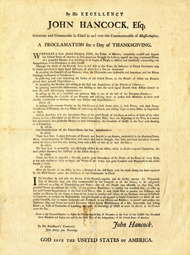Tales From the Archives: Giving Thanks

Happy Thanksgiving from NSDAR Archives and History! We are thankful for all of the wonderful treasures DAR members have generously donated to the Americana Collection over the years. In honor of the Thanksgiving season, we would like to highlight two documents in the Collection that serve as examples of our Founding Fathers’ thankfulness and point to a time in our nation’s history when Thanksgiving Day did not necessarily fall on a Thursday or even in the month of November.
The traditional celebration of Thanksgiving Day on the fourth Thursday in November is a relatively recent development in American history. After the pilgrims arrived at Plymouth, Massachusetts in 1620, Thanksgiving was observed only intermittently and locally until President George Washington declared that the people of the United States would observe “a day of public thanksgiving and prayer” on Thursday, November 26, 1789. Early nineteenth-century presidents continued to issue sporadic Thanksgiving Day proclamations that occurred on a variety of dates usually, but not always, during autumn harvest time. President James Madison declared April 13, 1815 a day of Thanksgiving. No president issued a Thanksgiving Day proclamation until President Abraham Lincoln revived the practice in 1862. Thanksgiving had its beginnings as a national holiday in 1863 when Lincoln permanently set aside the last Thursday in November; thus making Thanksgiving a predictable event from year to year. The tradition was finalized in 1941 when a Congressional Joint Resolution specifically and permanently set the holiday for the fourth Thursday in November.
 American presidents continue to issue Thanksgiving Day proclamations as a matter of tradition and all of their declarations express gratitude to a merciful God; however, the gifts American leaders choose to give thanks for tend to reveal which issues most preoccupy their minds. In 1863, Lincoln encouraged Americans to count their blessings even “in the midst of a civil war of unequaled magnitude and severity.” President Franklin Roosevelt remembered the suffering of the Great Depression in 1939 when he noted that the nation had “faced the specters of business depression, of unemployment, and of widespread agricultural distress” and yet had “been permitted to see the fruition of measures which we have undertaken in the realms of health, social welfare, and the conservation of resources.” At the first Thanksgiving after the end of World War II in 1945, President Harry Truman expressed thanks and relief “in this year of our victory, absolute and final…in this time of peace so long awaited.” In his 2004 proclamation, President George W. Bush urged Americans to convey “gratitude to our dedicated firefighters and police officers who help keep our homeland safe…[and to] Americans in our Armed Forces…and their families for their sacrifice.”
American presidents continue to issue Thanksgiving Day proclamations as a matter of tradition and all of their declarations express gratitude to a merciful God; however, the gifts American leaders choose to give thanks for tend to reveal which issues most preoccupy their minds. In 1863, Lincoln encouraged Americans to count their blessings even “in the midst of a civil war of unequaled magnitude and severity.” President Franklin Roosevelt remembered the suffering of the Great Depression in 1939 when he noted that the nation had “faced the specters of business depression, of unemployment, and of widespread agricultural distress” and yet had “been permitted to see the fruition of measures which we have undertaken in the realms of health, social welfare, and the conservation of resources.” At the first Thanksgiving after the end of World War II in 1945, President Harry Truman expressed thanks and relief “in this year of our victory, absolute and final…in this time of peace so long awaited.” In his 2004 proclamation, President George W. Bush urged Americans to convey “gratitude to our dedicated firefighters and police officers who help keep our homeland safe…[and to] Americans in our Armed Forces…and their families for their sacrifice.”
In the Americana Collection we have two examples of colonial-era Thanksgiving Day proclamations. One proclamation was given in the midst of the Revolutionary War in 1779 for the people of Massachusetts by Samuel Huntington, President of the Continental Congress. The other Thanksgiving Day Proclamation was made by Governor John Hancock of the Commonwealth of Massachusetts in 1781. Both statements offer thanks for blessings bestowed on the State. Huntington’s proclamation focuses on the good fortune of his ancestors as he offers “gratitude and praise for the wonders which [God’s] goodness has wrought in conducting our forefathers to this Western World,” while Hancock’s declaration petitions Providence “to assist and support the United States of America in their important struggle for liberty against the long continued efforts of a powerful nation.”
We give thanks for the men and women who came before us, represented by the many precious documents included in the DAR Americana Collection. May blessings grace your table this Thanksgiving season.


 Today's DAR
Today's DAR